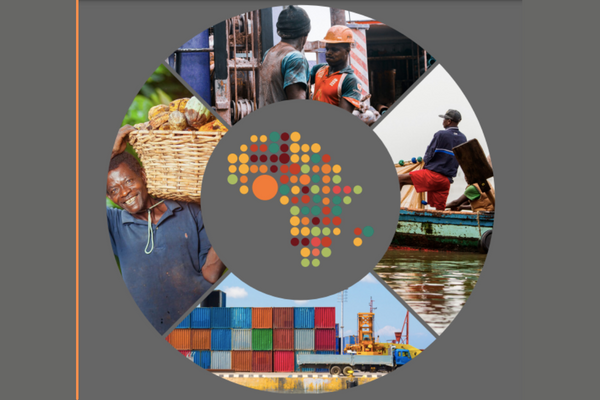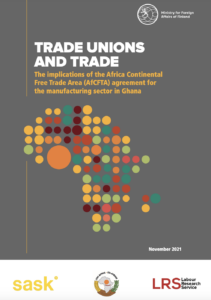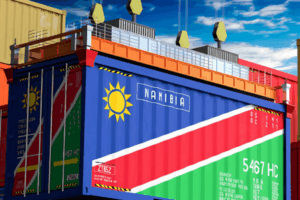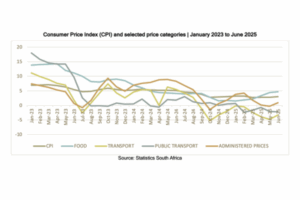Our new study shows there are real opportunities for Ghana to enhance its manufacturing capability and create jobs under the Continental Free Trade Area (AfCFTA) agreement. But there are also perils that would need the attention of stakeholders in order for businesses and citizens to benefit under the agreement.
Key findings
The AfCFTA could bring much-needed access to a bigger African market
AfCFTA can deliver several positive economic and non-economic outcomes. Notably, the reduction of trade tariffs and the elimination of non-tariff barriers under the AfCFTA has the potential to bring about welfare gains by enabling increased access to cheaper goods among consumers on the continent, including Ghana. In addition, the AfCFTA can lower the production costs of entrepreneurs through improved access to cheaper intermediate inputs for production. This can promote manufacturing and in particular agro-processing in Ghana and also on the continent at large.
The other opportunities of the AfCFTA relate to the creation of a bigger market for producers which can unlock the manufacturing potential and facilitate industrialisation in order to bring about sustainable development and job creation. The expected expansion of national output – Gross Domestic Product – will boost Ghana’s fiscal revenues as it offset the decline in revenues from the reduction or even elimination of tariffs. Thus, Ghanaian consumers, businesses and entrepreneurs in the country, and the government of Ghana stand to benefit from the creation of the AfCFTA.
Real GDP growth rate (%) by sector

The AfCFTA can negatively affect growth, employment creation and employment conditions in Ghana
Nonetheless, it is important to note that the AfCFTA can pose immense challenges to economic development and employment creation in Ghana.
First, the positive outcomes of the AfCFTA are not going to come automatically, especially when Ghana has limited capacity in merchandise export, including manufactured goods. Data from the United Nations Conference on Trade and Development (UNCTAD) indicate that Ghana’s share in global merchandise export was only 0.082 per cent in 2019 (UNCTAD, 2021). This shows that the country is not in the best position to harness the market access that the AfCFTA provides. Furthermore, in the agro-processing and manufacturing sectors where most value addition can occur – among the small and medium scale operators – an ambitious and over-liberalised trade regime can lead to competition from large and efficient firms from other African countries which may undermine the growth and employment creation of small and inefficient firms in the country.
Trading across borders for Ghana, Sub-Saharan Africa, and OECD (High Income Country)
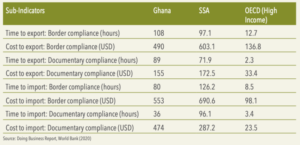
In addition, history teaches us that trade agreements and economic integration do not necessarily lead to fair and stable outcomes for everyone. This is because even in situations where jobs are not displaced, wages may decline in countries where imports exceed exports for small and medium scale operators in the agro-manufacturing sector. It is also important to note that reduced trade can also occur with trade liberalisation. The period of trade liberalisation and indeed economic liberalisation in Africa has coincided with a fall in the continent’s share of world trade.
The continent’s share of global trade has fallen from about 6 per cent in the mid-1980s to just 3 per cent currently, according to the Africa Union. This shows that the AfCFTA, like all trade agreements geared towards liberalisation, can negatively affect growth, employment creation and employment conditions in Ghana.
What needs to happen
The study, Trade Unions and Trade: The implications of the African Continental Free Trade Area (AfCFTA) agreement for the manufacturing sector in Ghana, examined the implication of the AfCFTA for the manufacturing sector in Ghana. The study focused on the opportunities and challenges that the AfCFTA presents to the manufacturing sector. It also examines the implications of the AfCFTA for trade unions and the protection of workers’ rights.
The selection of the manufacturing sector was based on the fact that it draws a large swathe of workers and places them in productive and decent jobs . The sector is associated with increasing returns to scale. The manufacturing sector has backward and forward linkages to the agricultural and services sectors and can create both direct and indirect jobs along the value chain. Thus, the study of what the AfCFTA means for the manufacturing sector in Ghana give useful insights into the potential impacts of the AfCFTA on the economy and employment situation in the country.
The analysis, which includes the views of business associations and unions, indicates that the AfCFTA offers the greatest potential for Ghana to build a stronger manufacturing base and create decent employment. This potential is based on the larger market that beckons Ghana following the market access liberalisation under the AfCFTA. The removal of tariffs will benefit Ghanaian producers as they get access to cheaper raw materials. The current industrial policy framework of government anchored under the one-district-one-factory initiative places Ghana in a firmer position to benefit from the AfCFTA. But there are also perils in the AfCFTA for Ghana.
Officer at Industrial and Commercial Workers’ Union"The fear of the ICU is that by opening ourselves in the direction we have under the AfCFTA, our businesses will be killed by competition from other countries because we are not there yet … if we don’t look at this fundamental issue and address [it], our infant industries are going to be strangulated because clearly, we don’t have the machinery to get things done."
Ghana must address a number of internal constraints including infrastructure and access to finance for businesses and citizens to benefit from the agreement. Without water-tight rules of origin, the AfCFTA could lead to an increase in trade but that trade will be diverted to third-party countries and regions. Ghana and much of the continent will lose out on the potential gains.
National officer at Association of Ghana Industries“The 15 to 17 cents per kilowatt-hour we pay for electricity is too much for Ghanaian businesses. Our competitors in most of the other nations under the AfCFTA, such as Ethiopia, pay less than 1 cent per kilowatts hour.”
The possible creation of low-skilled jobs and the absence of labour provisions could lead to worsening labour conditions under the AfCFTA. A stronger social framework including dialogue mechanisms that allow unions to be part of the AfCFTA process needs to happen without further delay.
Official at General Agricultural Workers’ Union“The AfCFTA will lead to upsurge in capitalism while our strategies for organizing will have a setback under AfCFTA. This is because jobs will be fluid, resulting from fluid capital. Free movement of labour from different countries to Ghana to work and vice versa and this will pose a challenge for trade unions in terms of coverage.”


